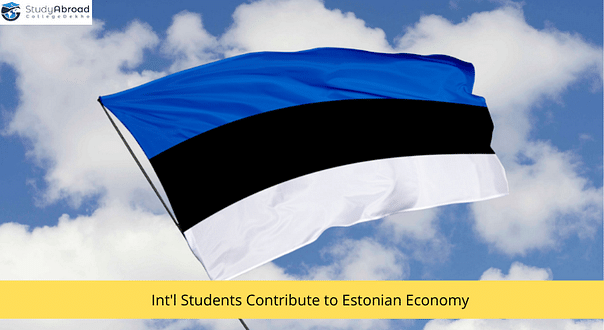Latest Update(March 11, 2022):The casket of the Estonian government has been enriched with the 16 million EUR from the toil of the international working students according to Statistics Estonia. Though the number of working professionals was fewer than in previous years yet their income was substantially high. The international student community stands at 11.6% in Estonian higher education. Working international students contributed 3.6 mllion EUR in income tax and 7.8 million in social tax.
The international students are mostly working in the information, communication, and education domain. The number of professionals working in the food and accommodation industries reduced due to the pandemic.
Also Read:Regular International Flights from India to Resume from March 27
The research reveals the susceptibility of international students to the insecurities of the job market and they have to juggle multiple jobs. Head of the Study in Estonia program at the Education and Youth Authority Eero Loonurm, opines that international students must be imbibed in the local and central government institutions and should reap the benefits of the same.
In Tallinn and Tartu, the working language is English, and therefore students contribute more to the local internationalization and academic qualities. But the benefits should trickle down to the whole country according to him. He is looking forward to Estonia gaining international benefits from international students.
Also Read:Indian Students Prefer Courses in AI and Robotics for Study Abroad: Survey
He wishes to take inspiration from New Zealand, the UK, Australia, and the Netherlands, who are focusing on reverse migration trends from cities or capitals o more regional areas so that the other regions can equally flourish.
Source: The PIE News
Find the Right Universityfor You to Study Abroad!
______________________________________________________________
(February 1, 2021) - A recent survey in Estonia revealed that the international student community has added 10 million to the treasury through social tax and income during the 2019-20 academic year. It also revealed that 3 million was added by international graduates of Estonian institutions.
Estonia saw the largest number of international students in its higher education institutions in the year 2019-20, which was 5,520. However, the number dropped by 200 in Estonian institutions in the year 2020-21 to just over 5,200.
Studies have revealed that many international students have selected certain countries as their study abroad destination due to their ability to work while they study.
Eero Loonurm, the head of the Study in Estonia programme at Education and Youth Authority, stated that i-graduates International Student Barometer revealed that the expenditure on housing and daily living amounted to nearly 33 million in the previous academic year.
The barometer also highlighted that 75% of the international students in the country chose an Estonian University as a result of being able to work while pursuing higher education. Data collected previously also revealed that international students have contributed over 10 million in tax during the 2017-18 and 2018-19 academic years.
The recent statistics show a 12.5% hike in the income and social tax contributions of the international students, wherein they added 8 million to the treasurys chest, in 2019-20, from the previous 2018-19 data
Also Read: International Students Invited to Apply for Grants and Tuition Fee Waivers to Study in Italy
Further revelations from these studies also highlight an increase in the income tax contributions to 3.1 million in 2019-20 from the previous 2.4 million. Meanwhile, an increase in social tax contributions was also witnessed, from 5.6 million to 7 million.
Further details revealed by the study, highlighted those international students enrolled in the ICT, engineering, manufacturing and construction, business administration and law were more likely to work while studying. These students were also more likely to stay back and continue working after graduation. Meanwhile, health & welfare and agriculture students were the least likely to work during their studies.
It was also revealed that international students often opted for international organisations that local business when compared to local students. The IT, hospitality and education sectors were the more common sectors of employment among the students.
However, this number took a hit in the 2020-21 academic year as the international education sector did not see as many applicants due to the prevailing circumstances. Like in other countries, COVID-19 restricted the number of students who could apply and travel to the country and commence their higher education studies.
Also Read: Latvian Borders to Reopen for Foreign Full-time and Exchange Students
Loonurm stated further stated that the number of graduates who remain in Estonia and continue working in the country grows continuously each year. As per current regulations, all Non-EU students are allowed to stay back in the country 270 days after graduation to find a job. Once employed, graduates are then allowed to apply for a temporary permanent residence.
Allan Padar, the Estonian Minister of Education and Research stated that recruiting international students into the labour market as opposed to foreign talent can be more effective. Stating that international students become accustomed to the local culture and environment while also growing their social network during their studies can simplify their entry and stay in the labour market post-graduation.
Loonurm suggested that the first step in the internationalisation of higher education is to refine the quality of education. With the impressive economic impact due to the rise of international students in the country, the common good will also be affected.
Loonurm stated while the number of international students has increased over the past 5 years, the next step is to retain the international students in the country.





















